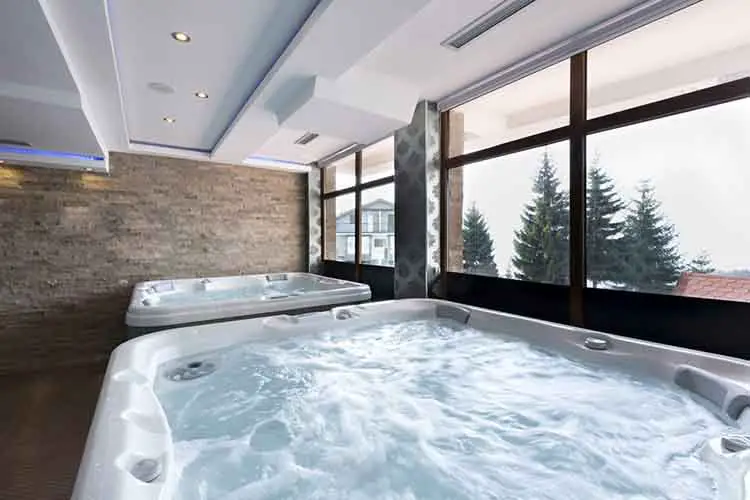If you needed more reasons to get a hot tub, getting a better night’s sleep is one of the many health benefits of a good soak. There are many reasons why people enjoy a deep soak in a hot tub. At the end of a busy workday, it is very comforting to relax in the hot tub. It can help you download from the workday and provides other benefits as well. Below we look at the many benefits that hot tubs offer.
Why Hot Tubs Are Good for Your Health:
Hot tubs offer a wide range of health benefits both mentally and physically. Here are some of the best reasons to indulge in a hot tub, according to Healthline.
- Relieves stress: Hot tubs can give you relief from the outside world and help relieve the stress of daily life. It can reduce tension and has a soothing effect on the body and mind. Those that have massage jets, add to the comfort and tension relief. Adding subtle lighting, soft music and aromatics only heighten the stress-relieving agents of a hot tub.
- Muscle relaxation: The swirling action of a hot tub can soothe tight muscles, aches, and pains. Pointing the jets at the painful area can help bring relief. Spending time in the hot tub can also help to reduce injuries before taking part in strenuous activities.
- Relieves pain: Soaking in a hot tub can relieve pain caused by pulled muscles, joints, sprains, strains, and tendons. Those that have arthritis may find that the hot time can relieve the pain and stiffness of arthritis and improve flexibility.
- Good for cardiovascular health: Enjoying the warmth of a hot tub can raise your heart rate and lower blood pressure. The U.S. National Library of Medicine, National Institute of Health, conducted a study that “thermoneutral water immersion reduced diastolic blood pressure.” It also is considered a positive treatment for improving heart health, especially for those that are unable to exercise frequently.
- Improved insulin sensitivity: A 2015 study published on PubMed, stated that heat therapy in those with type 2 diabetes had a reduction of 1% in glycated hemoglobin, which may be healthy as long as those this is monitored and approved by a physician.
- Calorie burning: A study found that those that soak in a hot tub burned as many calories as taking a 20-30 minute walk. This shows that it can help increase metabolism but should not replace regular exercise.
5 Ways Hot Tubs Improve Sleep:
One of the best things about soaking in a hot tub is that it can be conducive to sleep. So if you are looking at alternatives to sleep aids, try a soak for a more restful sleep. A key element of overall well-being is to get a good night’s sleep. While everyone has an occasional bad night, if it is an ongoing problem, it could be impairing the quality of your life. The need for sleep is critical to our well-being and good health.
How hot tubs help you sleep better
- Pain relief – the warm water and pressure jets help alleviate sore muscles and you sleep better when your body is pain-free.
- Heat – After the heat of a hot tub, the body naturally starts the cool down process which signals our brains it’s time for bed.
- Relaxation – soaking in the tub helps you unwind from the day and clear your mind for sweet dreams.
- Mindfulness – being in a hot tub helps you focus and enjoy the present moment which prepares you for a deeper sleep
- Connection – it’s easy to connect with loved ones in a hot tub – with no phones or distractions. This can be a great way to unwind before bed.
Many people find that reading before bed, listening to soothing music, and relaxing in a hot tub can reduce stress and anxiety, which often are the causes of insomnia and other sleeping issues. The worse thing you can do is engage in stressful activities like watching TV, paying bills, working, or getting into deep conversations before heading to bed.
Hot Tubs are Not for Everyone?
Those that have underlying health problems should be careful before getting into a hot tub. If you have underlying health conditions or are in doubt, please consult with a physician before taking the plunge.
Here are some of the illnesses that may put someone at risk if not approved by their doctor:
- Heart disease: Those with a family history of heart disease or who have been diagnosed with heart disease should avoid them unless it is approved by a medical professional. The hot water may elevate blood pressure. While it may be safe for some, it is not safe for everyone.
- Pregnant women: Expectant moms should avoid getting overheated, which can happen in a hot tub. It may be harmful to the baby; if the mom is overheated and has elevated blood pressure, this could be detrimental to the mom.
- Skin scrapes and injuries: Do not soak in a hot tub if there are any unhealed sores or scabs. It may cause irritation and even infection in some cases. It is best to wait until the wound is healed.
- Low blood pressure: Those with a history of fainting should not go into a Jacuzzi or hot tub. The water can lower blood pressure further and cause lightheadedness when getting in or out of the hot tub. Those will low blood pressure can find themselves in an unhealthy situation if they stay in too long.
- Urinary tract infections (UTI): Anyone that has had a UTI understands how painful it can be. Those with a UTI should wait until the issue is cleared up, as it may make the symptoms pain even worse.
Hot Tub Tips:
Here are some tips for enhancing your hot tub experience.
- Always make sure the hot tub is clean and well-maintained. The water should be crystal clear, not cloudy. The water needs to be changed often to prevent skin infections.
- Avoid water that is over 104 degrees. It should be comfortable and not too hot.
- Hydrate before, during, and after your soak as it can make you sweat and become dehydrated.
- Limit your time to 10-15 minutes. You can stay in longer if the hot tub is at a cooler temperature.
- Get out of the hot tub if you experience dizziness, redness, nausea, or difficulty breathing.
- Avoid or limit alcohol consumption which can be dehydrating.
When used properly, a hot tub could be the perfect way to end the day and get a relaxing night’s sleep.



